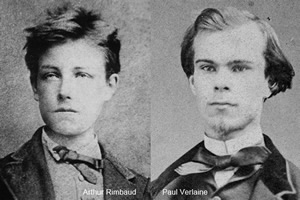Hugh Schofield* says France is split over a proposal to re-inter much-loved gay poets, Arthur Rimbaud and Paul Verlaine, in Paris’ National Mausoleum.
 French President, Emmanuel Macron is under pressure to strike a blow for sexual diversity by ordering two of the country’s best-loved poets to be re-buried at the Pantheon, or National Mausoleum, in Paris.
French President, Emmanuel Macron is under pressure to strike a blow for sexual diversity by ordering two of the country’s best-loved poets to be re-buried at the Pantheon, or National Mausoleum, in Paris.
A petition signed by 10 former Ministers for Culture, as well as artists and intellectuals, says the poets, Arthur Rimbaud and Paul Verlaine, who had an intense but ultimately violent affair in the early 1870s, “were symbols of diversity”.
“It is a question of simple justice to have them enter jointly into the Pantheon alongside other great literary figures like Voltaire, Rousseau, Dumas, Hugo and Malraux,” the petition reads.
Current Minister for Culture, Roselyne Bachelot, while not signing the petition, nevertheless said she agreed.
“Bringing these two poets and lovers into the Pantheon would have a significance that is not just historical and literary, but profoundly relevant today,” Ms Bachelot said.
The call, however, has triggered an angry backlash, with opponents saying the poets are being made the victims of a 21st century cultural power-grab, and that absolutely nothing in their lives or work suggests suitability for a patriotic Valhalla.
Rimbaud and Verlaine are certainly among the most revered of French poets, and it is also true that of the 75 residents of the Pantheon, none is there for poetry. Victor Hugo was transferred for his political achievements.
Supporters say there are both literary and moral reasons for their re-interment.
Not only has “their genius nourished for more than a century our literary and poetic imagination”, but also their current burial places — in Charleville, Lorraine for Rimbaud; in a cemetery off the Paris ring road for Verlaine — are “unworthy”, they say.
There is also the homophobic persecution which Verlaine, above all, had to endure.
Famously, the poets’ relationship ended in 1873 when Verlaine fired a gun and lightly wounded Rimbaud in Brussels.
Rimbaud refused to press charges, but Belgian police went ahead anyway and their report was heavily slanted by their distaste for the poets’ relationship.
Verlaine spent a year-and-a-half in jail.
Other opponents maintain it would make a mockery of what the poets actually stood for, which was certainly not membership of the French establishment.
Rather it was liberty, rebellion, and a refusal to kowtow to the cultural zeitgeist, they say.
“Everything about their lives, everything about their work, shows them turning their back on society,” writer Étienne de Montety said.
“They were passionate for liberty, to the point of making transgression an art form.
Resenting the slight, today society is taking its revenge. With the help of academia and Government, it is trying to co-opt them.”
Others have pointed out that support for the motherland was not exactly the poets’ strong point.
In the 1870 Franco-Prussian war, Rimbaud even said he would welcome a Prussian victory.
Of the Pantheon itself, the poet once said that it was an “official acropolis which takes modern barbarity to new extremes”.
*Hugh Schofield is the Paris Correspondent for the British Broadcasting Corporation (BBC). He has previously worked across Europe, the Middle East and the United States.
This article first appeared on the BBC World website


